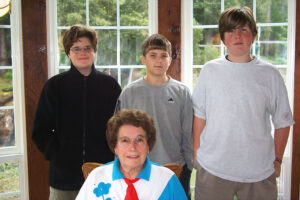
“Today is Friday, February 2, 2001 and I’m Charlie Carter.
And I’m Kyle Houghton from the Mendocino Middle School Oral History Project. Our technical recorder is Travis Bell. Okay, we’re talking today with Eugenie Efishoff also known as Dolly, and her niece Carol Rallinshomes on Cummings Lane about a mile east of Mendocino. Joining in this conversation is Steve Jordan, a community member who is assisting us with this project.”
So begins the 12th and our last installment of the oral history series we started publishing in 2019, but which was originally created 20 years ago by a group of young people interviewing “old timers.”
Men and women from all walks of life shared their memories during these conversations. The Kelley House has preserved their stories on audio CDs (and the typed transcripts) for anyone who might want to listen.
Dolly was born on May 10, 1927, in Mendocino to Minnie Paoli and her Italian-born husband, Mario Baris. From an early age she lived with her extended family and grandparents, Raffaelo and Amelia Paoli, who operated the Paoli Hotel (Lisbon House) on Ukiah Street.
The young interviewers wanted to know about the old hotel. Dolly explained that when she was young, it had about 12 rooms. “Most of the boarders living there were single men because either they weren’t married, or they had left their family in Italy or wherever. I had my own room, but bedrooms in those days weren’t big. They just had a bed and they had like a commode and then they had a basin with a pitcher on it to put water in. And that’s all they had in the bedroom.”
The hotel also had a bar that served drinks. “Yes, my grandfather and his brother, they had to make wine every year, even if they never painted the house, they had to have their wine. So, they would order the grapes from Ukiah, and they usually bought a ton of grapes. Fifty dollars, I think, was the price. And so everybody would come and help.
They’d unload those grapes, and they had a crusher, and they had this big tank, it was in the house. It was a great big tank, and in Italian they called it a “Tino.” And they would dump these boxes of grapes into the crusher, and these guys would turn the crusher, then this tank would keep getting full of grapes. And then, after that was all done, it had to stay there to ferment for, you know, about two, or maybe three weeks, I’m not sure.
Then, my grandpa had this thing like a great big oar. And he would stir, stir those grapes, you know. And then, after that, they had a hose, with a great big funnel, and underneath the house they had the barrels.
Now my grandfather had to get these barrels ready for the wine every year. And he’d take and wash them out with vinegar and stuff, and then they would burn sulfur inside of them. Because sometimes, your wine turns to vinegar if it’s left in the barrel. And boy, these barrels were big, you know, they weren’t little barrels, they were big barrels.
So, he would put this barrel under the house, with the hose, and the juice from the tank would go down into the barrel. Then, when they got all the juice out of that tank, they had a squeezer. They’d throw it inside, this squeezer, and it would come together and squeeze those grapes. You know, and that was more wine, they never wasted anything. And then the grapes, he’d take them out on a wheelbarrow, and he threw them on the manure pile. That’s how he made his wine.”
Dolly’s life really changed after the United States entered World War II in 1941. She recalls how she and her grandparents had to move from their home in the hotel on Ukiah Street to a house east of Lansing Street, which was the boundary line for the “Exclusion Zone.” Although they had been in the country since 1901, Raffaelo and Amelia had not become American citizens, and were therefore considered “Axis Aliens” because they had been born in Italy, one of the countries with whom the US was at war.
She also speaks of the close community that existed in Mendocino during her youth, how people took care of each other. And when asked by the children what were her hopes for the future of Mendocino, she says, “I hope it stays the way it is. When I lived in Mendocino, on Main Street, there were buildings on the south side. You know, big buildings, and they tore those down and it’s kind of a shame. So, it’s nice that they keep the town as it is.”
Dolly is with is still – and will celebrate her 94th birthday next month.
Keep in touch with the Kelley House! Go to kelleyhousemuseum.org to become a member, subscribe to our newsletter, and learn more about Mendocino’s history with our online collections and exhibits.